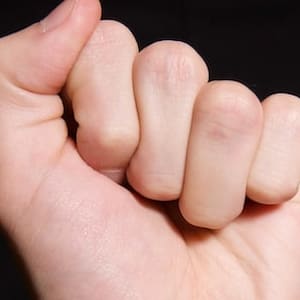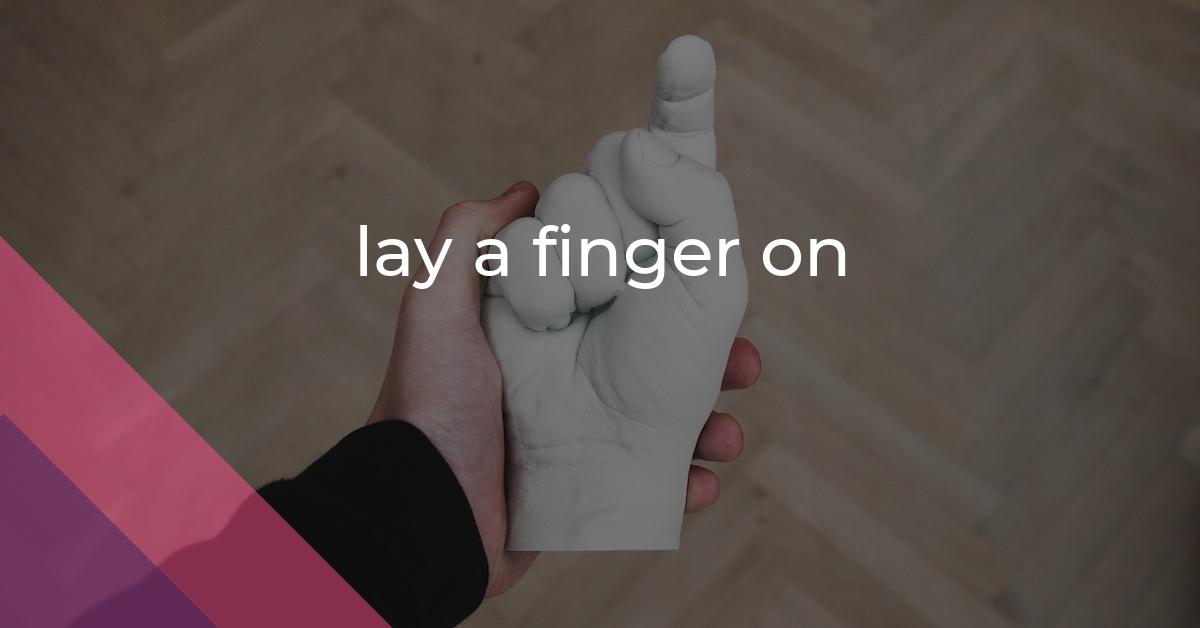lay a finger on: Idiom Meaning and Origin
What does ‘lay a finger on’ mean?
The idiom lay a finger on means to touch or harm someone physically or emotionally, often with the implication of aggression or violence.

Idiom Explorer
The idiom "lay something at the feet of" means to hold someone responsible or blame someone for something. It implies the act of attributing a problem or fault to someone else.
The idiom "lay on the line" means to take a risk or be open and honest about something, often exposing oneself to potential danger, criticism, or negative consequences.
The idiom "lay on" means to apply or administer something, usually in a forceful or excessive manner. It can also refer to providing or giving something, often in a generous or lavish way.
The idiom "lay off" means to stop doing or using something, to stop bothering someone, or to stop employing someone, usually due to a lack of work or financial issues.
The idiom "lay it on thick" means to exaggerate or overdo something, especially when expressing emotions or flattery, in order to create a stronger impact or influence on someone.
The idiom "lay hands on" means to find or acquire something, often with a sense of urgency or determination.
The idiom "lay eyes on" means to see or look at something. It implies that the person looking at something has a strong desire or interest in it.
The idiom "lay at someone's door" means to blame someone for a particular situation or problem. It suggests that the responsibility for the issue rests solely on that person.
The idiom "knuckle sandwich" means to punch someone with your closed hand, typically hitting them in the face. It is a figurative expression used to convey the act of physically assaulting someone.
The idiom "kick into touch" means to deliberately avoid dealing with something or to delay a decision or action. It is often used in contexts where someone is trying to avoid taking responsibility or facing a difficult or unpleasant situation.
The Untouchable Touch
The idiom "lay a finger on" is a commonly used expression in the English language. It is often used to convey the idea of physically touching or harming someone or something. The phrase can also be used metaphorically to indicate taking any kind of action or making any attempt towards someone or something.
The origin of this idiom can be traced back to the early 17th century. The word "lay" in this context refers to the act of placing or putting something down. In this idiom, it signifies the act of making contact with a person or thing. The word "finger" refers to the digit on the hand, associated with touch and interaction.
When used in a literal sense, this idiom implies the act of making physical contact with someone or something. It can denote a gentle touch or a forceful action, depending on the situation. For example, if someone says, "I wouldn't lay a finger on him," it means that they would not physically harm that person.
In a figurative sense, "lay a finger on" can imply taking any action towards someone or something. It can express the idea of affecting or influencing a situation, object, or person. For instance, if someone says, "He didn't lay a finger on the project," it means that he did not contribute in any way or take any action to help with the project.
The idiom "lay a finger on" is widely used in both formal and informal contexts. It can be found in literature, everyday conversations, and various forms of media. Its versatility allows it to be employed in different situations where the act of physical contact or taking any action is being emphasized.
The related idiom "lay hands on" is similar to "lay a finger on" in terms of physical contact or harm, but it carries a stronger implication. When someone says they will "lay hands on" someone or something, it signifies a more forceful and aggressive action compared to simply "laying a finger on" them. This phrase is commonly used in situations where a person intends to physically confront or harm another person.
For example, if someone says, "Don't make me lay hands on you," it is a warning that they will resort to force or violence if provoked. This idiom is often used in confrontational or heated situations to communicate an imminent threat or display of aggression.
Another related idiom is "lay on," which shares similarities with "lay a finger on" in terms of taking action or making an attempt towards someone or something. However, "lay on" is often used in a more positive or constructive sense.
When someone says they will "lay on" something, it means that they will provide or offer it abundantly or generously. For instance, if someone says, "I will lay on the snacks for the party," it indicates that they will provide a generous amount of snacks for the event.
This idiom can also be used in situations where someone is providing or offering a service or experience. For example, if a hotel advertises that they will "lay on" a complimentary breakfast for their guests, it means that they will provide a free breakfast as part of their service.
The idiom "lay a finger on" is a commonly used expression that conveys the act of physically touching or harming someone or something. It can also be used figuratively to describe taking any action or making any attempt towards someone or something. The related idioms "lay hands on" and "lay on" carry different connotations and implications, highlighting the subtle variations in meaning within the broader theme of taking action or making contact.
Example usage
Examples of how the idiom "lay a finger on" can be used in a sentence:
1. She threatened him, saying if he laid a finger on her, she would call the police.
2. No one has dared to lay a finger on the boss, as he commands great respect and fear.
3. I warned my little brother not to lay a finger on my laptop, as it is fragile and expensive.
More "Verbs" idioms



